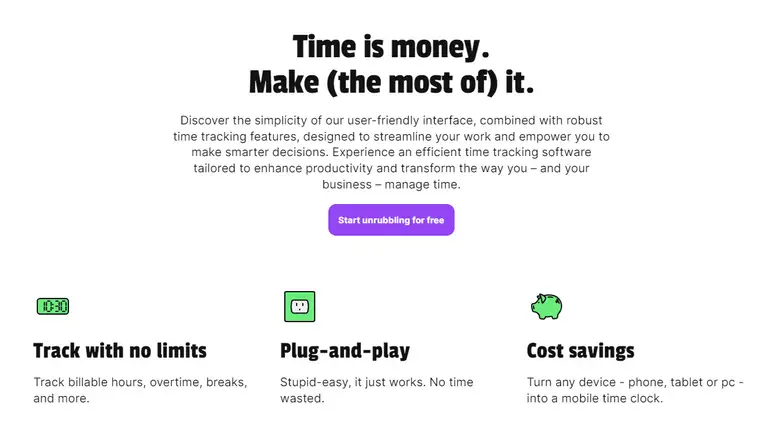Tick tock, tick tock... Time slips away, and our to-do lists keep getting longer.
But what if there was a way to harness time, make every moment count, and conquer our tasks with efficiency?
Enter the world of time boxing, a strategy that turns productivity into an exciting adventure.
In this article, we'll unlock the secrets of time boxing and show you how to master this powerful technique.
What is time boxing?
Time boxing is a simple time management technique where specific time slots, or "boxes," are allocated for different tasks or activities. It involves setting clear start and end times for each task and committing to completing them within those time frames.
This time management strategy is widely used in project management, Agile software development, and personal productivity systems. It’s done to optimize work time and achieve desired business goals.
Time boxing vs time blocking
Time boxing and time blocking are two different approaches to managing time and increasing productivity that often cause confusion.
Thus, let us explain the difference.
Time boxing involves allocating a specific time slot, or "box of time," for different tasks or activities. Each task is assigned a fixed duration within which it should be completed.
This approach helps create a sense of urgency and focus, as individuals strive to complete the task within the set time frame. Time boxing is flexible and allows for adjustments as needed, but the emphasis is on completing tasks within the designated time boxes.
On the other hand, time blocking involves blocking out larger chunks of time for specific activities or categories of tasks.
It involves scheduling blocks of time for different projects, meetings, or focus areas. Time blocking helps individuals create dedicated time for specific tasks. And it can be helpful for managing a complex schedule or prioritizing important activities.
Unlike time boxing, time blocking is less focused on the precise duration of individual tasks and more on creating dedicated time for different areas of work.
The choice between the two depends on individual preferences, work style, and the nature of the tasks or projects being managed.
- Approach
Time Boxing: Allocating specific time slots
Time Blocking: Blocking larger chunks of time
- Focus
Time Boxing: Completing tasks within a strict limit of time
Time Blocking: Dedicated time for specific activities
- Task Duration
Time Boxing: Fixed periods of time for each task
Time Blocking: Flexible duration for each block
- Emphasis
Time Boxing: Task completion within a time frame
Time Blocking: Creating dedicated time for different areas
- Flexibility
Time Boxing: Allows adjustments as needed
Time Blocking: Less rigid, more adaptable
- Precision
Time Boxing: Emphasizes task duration
Time Blocking: Less emphasis on task duration
- Task Management
Time Boxing: Structure and focus
Time Blocking: Managing complex schedules
- Prioritization
Time Boxing: Helps prioritize tasks
Time Blocking: Allocating time for important activities
- Work Style
Time Boxing: Suitable for time-sensitive tasks
Time Blocking: Suitable for focused work periods
The benefits of timeboxing
Time boxing can benefit both employers and employees on several different levels.
Boosted focus and productivity
Using this work management technique helps you allocate specific time periods for tasks. This, in turn, increases your focus and helps you work more efficiently.
Better time management
When you set a specific focus time for a single task, timeboxing lets you prioritize and allocate your time effectively.
Increased motivation
Having a set time frame for tasks creates a sense of urgency and can boost your motivation to complete them within the set time.

Enhanced task completion
Timeboxing encourages you to break tasks into smaller, more manageable chunks. Thanks to this, tasks become more achievable and the likelihood of completing them on time goes up.
Improved work-life balance
Thanks to allocating dedicated time for work and personal activities, timeboxing can help you achieve a better balance between your professional and personal life.
The drawbacks of timeboxing
It’s worth keeping in mind though that time boxing can also pose some potential threats.
Lack of flexibility
First, it requires sticking to predetermined time limits, leaving little space for workplace flexibility. This may not always allow for unexpected changes or delays in plans.
Pressure to adhere to schedules
The strict time limits of timeboxing can lead to increased stress and pressure to complete tasks. As a result, the quality of work could be potentially affected.
Difficulty estimating task durations
It can be challenging to accurately estimate the time needed for tasks, leading to inadequate time allocation or unfinished work.

Potential for burnout
Constantly working within rigid time limits could lead to fatigue and burnout. That’s, of course, if it’s not balanced with sufficient breaks and rest.
Not suitable for all tasks
Some tasks may require more flexibility and cannot be effectively managed within strict time constraints. This makes this task and time management technique less suitable for certain activities or jobs.
So should you give this effective time management technique a try? Despite the drawbacks of timeboxing, we believe it's worth a shot.
When you look at the potential benefits, there's so much to gain. So we encourage you to try it out.
But fear not - we won't leave you alone. Keep reading for a top guide on getting started with timeboxing techniques.
How to start with time boxing in 5 steps
If you’re looking to get started with time boxing, you can do it easily with the help of our 5-step guide:
Choose a time tracker
Start by selecting a time tracking app or productivity tool that suits your needs and preferences.
Look for features like time tracking, work scheduling, and leave time management to help you effectively manage your time.

Unrubble is a great choice for people looking to get started with time boxing because it offers a range of features and benefits that make work time management easier and more efficient.
With Unrubble, you can easily track your or your employees’ work time. This includes clock-in and clock-out times, and even meal breaks.
The software also provides tools for creating work schedules with a single click, ready for export to payroll apps.
You can plan your or employees' work schedules and manage online leave requests, simplifying the process of tracking vacations and days off for your team.
Unrubble is customizable to fit businesses of any size, from SMBs to Fortune 500 enterprises.
It has been trusted by over 150,000 users worldwide.
Unrubble offers a range of additional features, such as automatic clock-ins and outs, GPS locations, and photo verification to prevent buddy punching.
Check it out today for a smooth start to your time boxing journey.

Define tasks
Your second step is to identify the tasks or activities you want to work on during your time boxing sessions.
Break them down into manageable chunks or set specific goals for each session.
Examples of SMART goals:
- write a report for the upcoming project by the end of the day, ensuring it is well-researched, organized, and meets all the required guidelines
- prepare a presentation for the client meeting scheduled next week, focusing on delivering a concise and engaging presentation with clear objectives and key messages
- conduct thorough research on a specific topic within the next two days, gathering relevant and reliable sources to provide a comprehensive understanding of the subject
- respond to all important emails and messages within 24 hours, ensuring timely communication and addressing any inquiries or concerns effectively
- review and edit a document or proposal by the end of the week, focusing on improving clarity, grammar, and overall quality to enhance its impact
- create a detailed marketing plan for a new product within the next two weeks, setting clear objectives, target audience, strategies, and metrics for success
Block your calendar
Next, allocate specific time blocks in your calendar for each task or activity. You could have a monthly, weekly, or even a daily schedule.
Treat these time blocks as dedicated work sessions and avoid distractions during these periods.
Examples:
- use a digital work scheduler, such as Unrubble, to block out specific time slots for each task or activity; assign a start and end time for each block
- color-code your calendar to differentiate between different types of tasks or activities; for example, use green for work-related tasks, blue for personal tasks, and yellow for leisure activities
- set reminders or notifications for each time block to ensure you stay on track and start and end your sessions on time
- avoid scheduling conflicting appointments or meetings during your blocked time; protect these time blocks as sacred and prioritize your dedicated work sessions
- communicate your availability to others by sharing your calendar or updating your status to reflect that you are in a focused work session during specific time blocks
Get the work done and track your results
Start working on your tasks according to the designated time blocks.
Focus on completing the tasks within the allocated time and track your progress as you go with a time tracking app.
Use the insights from your chosen time tracking app to monitor the time spent on each task. Look for areas for optimization and see what you can get done really fast.

Get your reward
Once you complete a time box or achieve your goals for a specific session, reward yourself or your employees.
It could be a short break, a small treat, or anything that motivates you and provides a sense of accomplishment.
Celebrating your progress can help reinforce the habit of time boxing.
Reward examples:
- a healthy snack
- a hobby or leisure activity
- time with friends or family
- exercises or physical activity
- relaxation practices
- something special as a treat
Successful timeboxing with Unrubble
Now you know everything you should about time boxing!
To implement this work management technique, simply follow our five-step process.
When we embrace the power of time boxing, we can reclaim control over our time and make every moment count.
So, go ahead and embark on this exciting adventure of productivity.
P.S. And if you’re up for a guaranteed smooth start to time boxing - try Unrubble. We’ll happily get you started in the easiest way possible.
FAQ
What is the "time boxing" time management technique?
"Time boxing" is a time management technique where specific time slots, or "boxes," are allocated for different tasks or activities, with a clear start and end time for each task.
What are some productivity hacks for timeboxing?
Some productivity hacks for timeboxing include breaking tasks into smaller chunks, setting specific goals for each time box, eliminating distractions, prioritizing tasks, and using reminders or notifications to stay on track.
Should I use a calendar app for timeboxing?
Yes. Using a calendar app for timeboxing like Unrubble can be beneficial as it helps in blocking specific time slots for tasks, setting reminders, and maintaining an organized schedule. It provides a visual representation of your time blocks and allows for easy adjustments.
Is timeboxing good for a project manager?
Yes, timeboxing is often beneficial for project managers. It helps them allocate time for different project tasks, set deadlines, prioritize activities, and manage their team's time effectively. Timeboxing can improve focus, productivity, and overall project management efficiency.






